
Writing With a Broken Tusk
Writing With a Broken Tusk began in 2006 as a blog about overlapping geographies, personal and real-world, and writing books for children. The blog name refers to the mythical pact made between the poet Vyaasa and the Hindu elephant headed god Ganesha who was his scribe during the composition of the Mahabharata. It also refers to my second published book, edited by the generous and brilliant Diantha Thorpe of Linnet Books/The Shoe String Press, published in 1996, acquired and republished by August House and still miraculously in print.
Since March 2024, Jen Breach (writer, VCFA graduate, and former student) has helped me manage guest posts and Process Talk pieces on this blog. They have lined up and conducted author/illustrator interviews and invited and coordinated guest posts. That support has helped me get through weeks when I’ve been in edit-copyedit-proofing mode, and it’s also introduced me to writers and books I might not have found otherwise. Our overlapping interests have led to posts for which I might not have had the time or attention-span. It’s the beauty of shared circles.


Guest Post: Caroline Starr Rose on The Burning Season
Stephen Pyne’s article in Scientific American compels and informs but it’s also surprisingly lyrical.
“Earth is a fire planet, the only one we know of. Earth has fire because it has life.”
Fire, Pyne says, is like a virus—not truly living but needing the living world to spread by contagion. We humans provided the one thing that naturally occurring fire does not have—ignition. And so it happens, he suggests, that we have created a new kind of earth, a planet on fire in a time he dubs the Pyrocene.
One thing writers do is bear witness. My very dear friend and colleague Caroline Starr Rose has done just that, with her middle grade novel, The Burning Season.

An Indian Ocean Archipelago in Fiction and Real Life
The Andaman Islands lie in an expanse of water in the northeastern Indian Ocean 80 miles away from the coast of Myanmar. I’ve never been, although I grew up knowing they were out there—a far-flung Indian territory. A notorious penal colony was initially established there by the British. It held exiled Indian soldiers who took part in the 1857 rebellion, the same event that resulted in the British Crown taking the governance of India out of the hands of one of the world’s first multinational companies.
What I didn't know then was that among the people of the subcontinent who wanted to throw the British out were the indigenous Jarawa people of the Andamans, a tribe who still call the islands home, and have deep knowledge of the forests they have lived in for over 50,000 years.
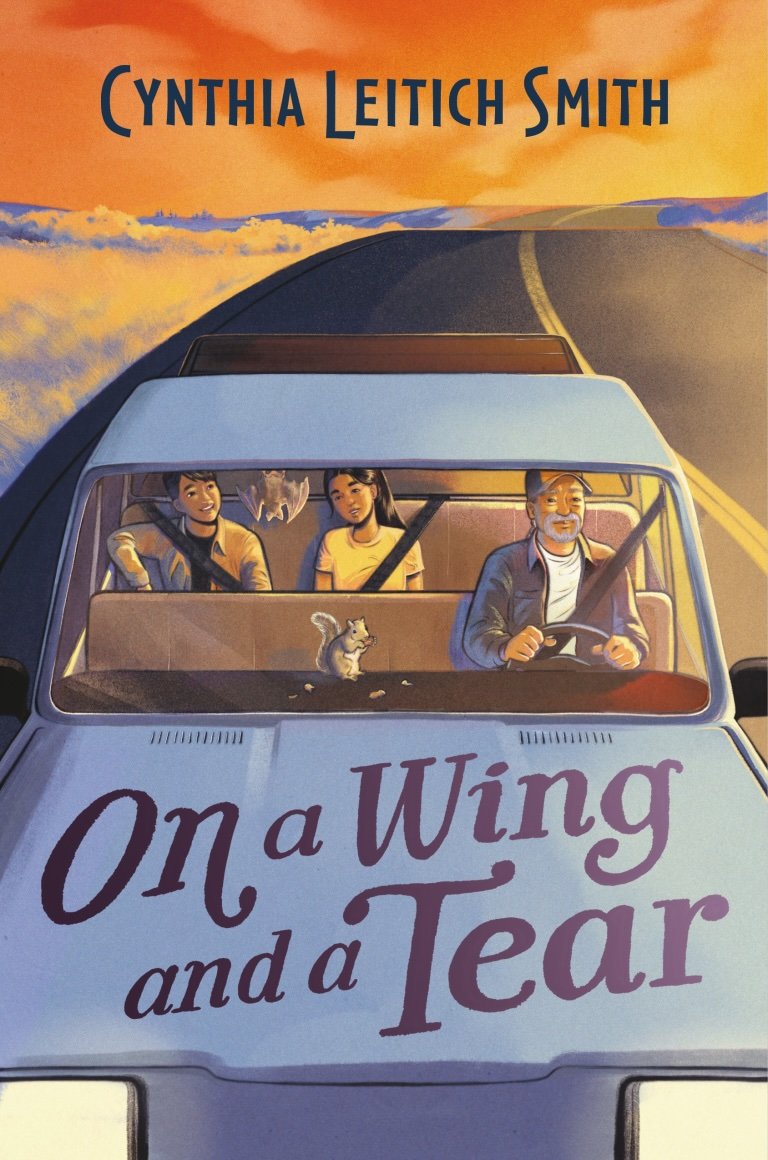
Process Talk: Cynthia Leitich Smith Discusses On A Wing and a Tear
Indian Shoes by Cynthia Leitich Smith was one of the books I used to make my students read to get a feel for a story that was about more than one kid. A story, in fact, that was more than one story. It was a set of interlinked tales about family and community and connections and a whole way of being in the world. So, when I found out that Ray Halfmoon and Grampa were going to make a grand return in this new book, I thought I knew where I was going. I should have known better.
On a Wing and a Tear delivers the same family warmth and loving humor that is so endearing in Indian Shoes but oh, my! This is a book with layers—history, adventure, humor, and perhaps the most marvelous of all, there's a whole wonderful animal storyline. This middle grade novel is packed with satisfying familiarity and delightful surprises. I asked Cyn to tell me more.
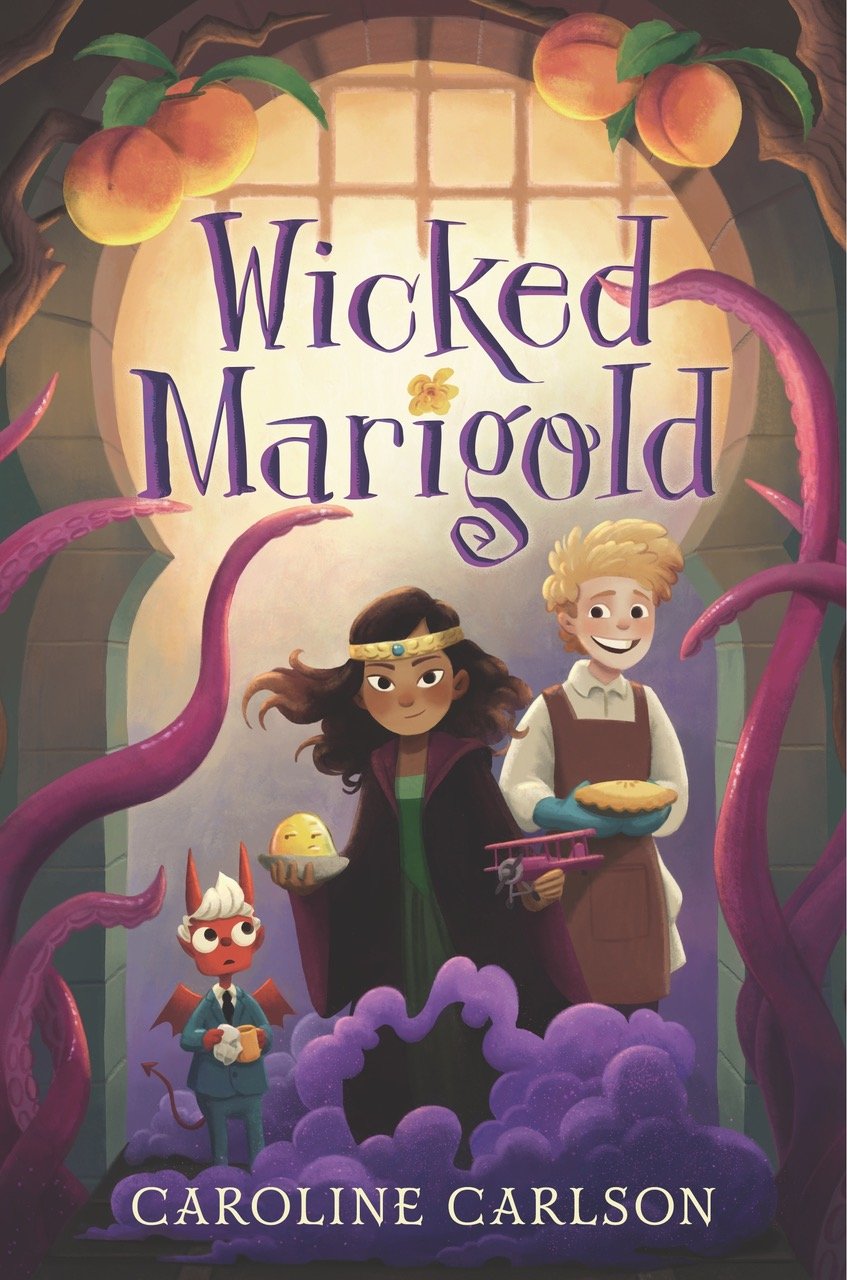
Guest Post: Caroline Carlson on Wicked Marigold
I smiled my way through Wicked Marigold, a middle grade novel by Caroline Carlson. In honor of Tell a Fairytale Day (February 26) I asked Caroline to tell me more about her experience writing this romp of a fractured fairytale. Here is her reply:
Old Narratives, New Worlds: Some thoughts on the long tradition of fracturing fairy tales
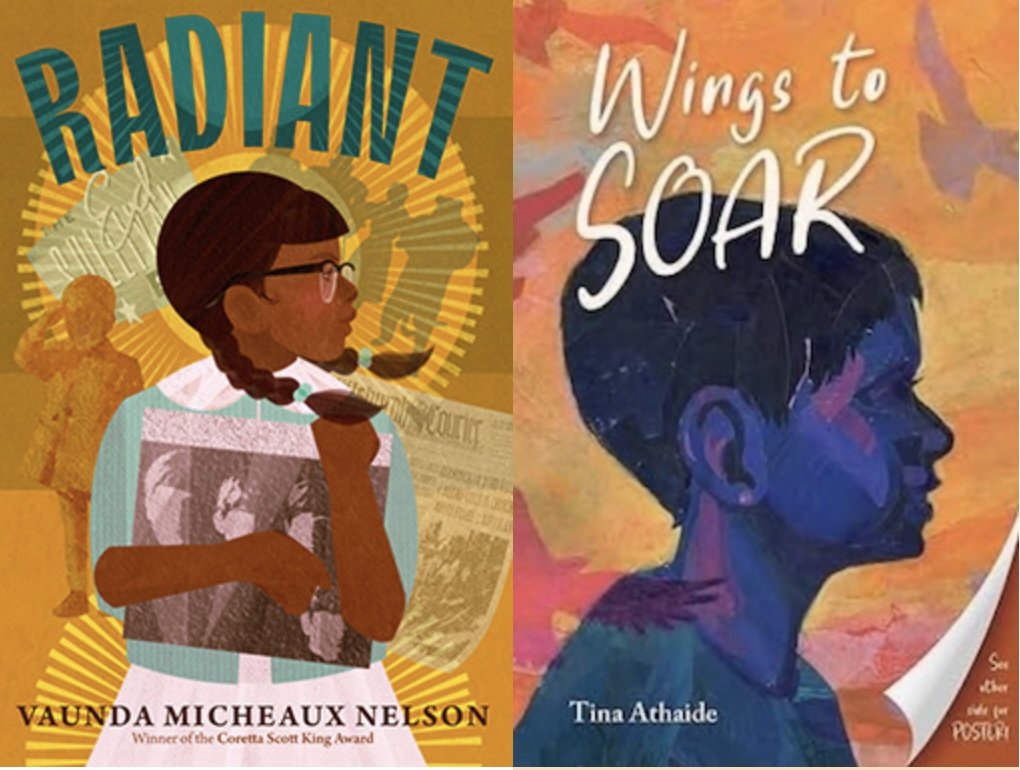
Vaunda Micheaux Nelson and Tina Athaide on Historical Verse Novels
I was privileged to read Radiant by Vaunda Micheaux Nelson poem by poem, as she wrote it. A few months earlier, I’d been delighted to read Wings to Soar by Tina Athaide.
Those two verse novels spoke to each other, with their musical threads, their self-aware young characters, and the histories unfurling in and around those characters’ families. So I knew I wanted these writers to talk to each other, and to me, about their books.
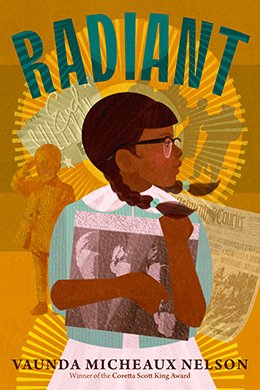
Guest Post: Vaunda Micheaux Nelson on Her Verse Novel, Radiant
Vaunda Micheaux Nelson is part of the New Mexico writing group that has given me support, critique, and loving friendship for some 26 years now. Today, Vaun has a new book out, Radiant, a verse novel written in the viewpoint of its young protagonist, Cooper. Here’s an excerpt from the publisher’s promotional copy:
As school begins in 1963, Cooper Dale wrestles with what it means to “shine” for a black girl in a predominantly white community near Pittsburgh. Set against the historic backdrop of the Birmingham church bombing, the Kennedy assassination, and Beatlemania, Radiant is a finely crafted novel in verse about race, class, faith, and finding your place in a loving family and a complicated world.
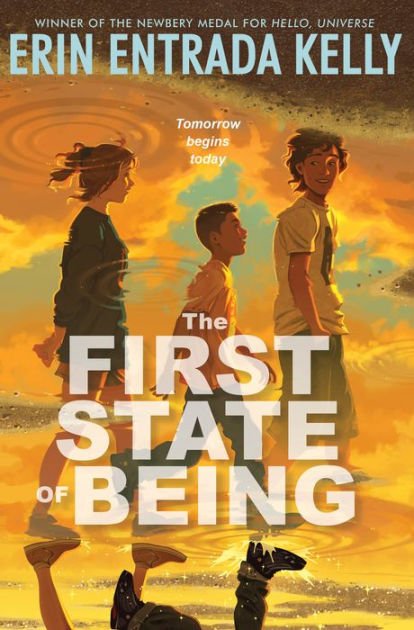
Time-travel and Y2K in Erin Entrada Kelly’s The First State of Being
For those intrigued by offbeat days dedicated to strange pursuits, December 8 is Pretend to be a Time Traveler Day. By whom this was first declared, and why, remain unclear, but let’s celebrate here by considering Erin Entrada Kelly’s middle grade novel, The First State of Being.
It takes a visitor from the future for the protagonist, 12-year-old Michael Rosario, to find himself. The novel raises questions about what it means to be human and to live in a particular time and place, and about how history is fashioned and shaped out of the lives of people.
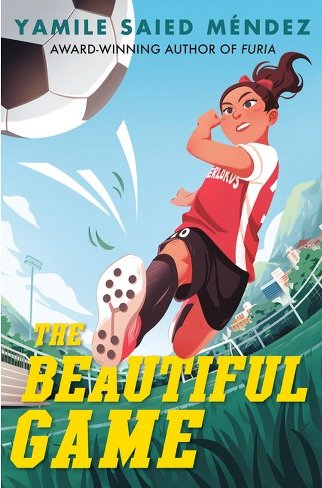
Process Talk with Jen: Yamile Saied Mendez on The Beautiful Game
[Posted by Jen Breach for Writing With a Broken Tusk]
There are similarities and differences between Yamile Saied Mendez’s The Beautiful Game (out now) and bestselling, beloved novel Furia (2020). Both are exceptionally compelling fiction led by talented and passionate female soccer players, raised in close-knit Argentinian extended families, who are trying to find the place in the world they believe to be theirs, even though others say different. From there nuance and difference unfold. The biggest difference, obviously, is that in the YA Furia, Camila is seventeen, and in the middle-grade The Beautiful Game, “Magic” is thirteen.
Jen talks to Yamile about The Beautiful Game.
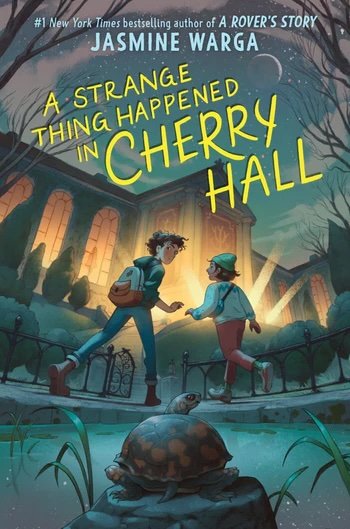
Process Talk: Jasmine Warga on A Strange Thing Happened in Cherry Hall
At the ABA Children’s Institute in New Orleans this summer, I ran intoJasmine Warga and picked up an ARC of her middle grade novel, A Strange Thing Happened in Cherry Hall. It’s a delightful middle grade that spins outward from the main character’s diffidence and self-deprecating humor to a theft at the museum where his mother works as a cleaner. The starred review in Kirkus calls it a “slowly unfurling delight.”
Here’s my email conversation with Jasmine about the book:

Process Talk: Tina Athaide on Wings to Soar
I love it when histories usually considered obscure find expression in fiction for young readers. I’m doubly delighted to see verse added to the mix in Wings to Soar, from my colleague, friend, and former student, Tina Athaide.
Young Viva’s family is from Goa, embodying the syncretic cultural, linguistic, and religious traditions of that previously Portuguese colony in western India. They’ve made their home in Uganda but in 1972, they are expelled from there by dictator Idi Amin, and sent to a resettlement camp in England. Not all of them make the trip. Viva’s father was supposed to meet them in London, but he never shows up.
Here’s my conversation with Tina Athaide.

Guest Post: Ritu Hemnani on Lion of the Sky
“An exquisite, memorable story about new beginnings and the quest to belong.” That’s how Kirkus Reviews described Ritu Hemnani’s Lion of the Sky. It is a novel about friendship, set against the tormented backdrop of the 1947 Partition of India. Hemnani uses unrhymed verse, with all its lightness and white space, to tell a story with a weighty context and a deeply wrenching storyline. She pulls the challenge off with grace and sensitivity. From the beginning, and through the tumult that is to come, the story anchors us close to the child character, 12-year-old Raj, free as the wind, his most earnest hopes pinned on winning the Kite Festival. Read the opening of this poem, “Daring,” to see what I mean:
I fly/ through the fields of Sindh,/ of wildflowers and birdsong,/ my suthan pants flapping/ cool wind against my cheeks.

Why You Should Read (or Reread) Emil and the Detectives
In 1929, a German writer named Erich Kästner published a book for children titled Emil und die Detektive. An English translation was published in 1931, Emil and the Detectives. In 1934, all of Kästner’s, except Emil, were publicly burned by the Nazis and his writings were banned. Kästner stood nearby, watching his books go up in flames. Emil was burned a year later.
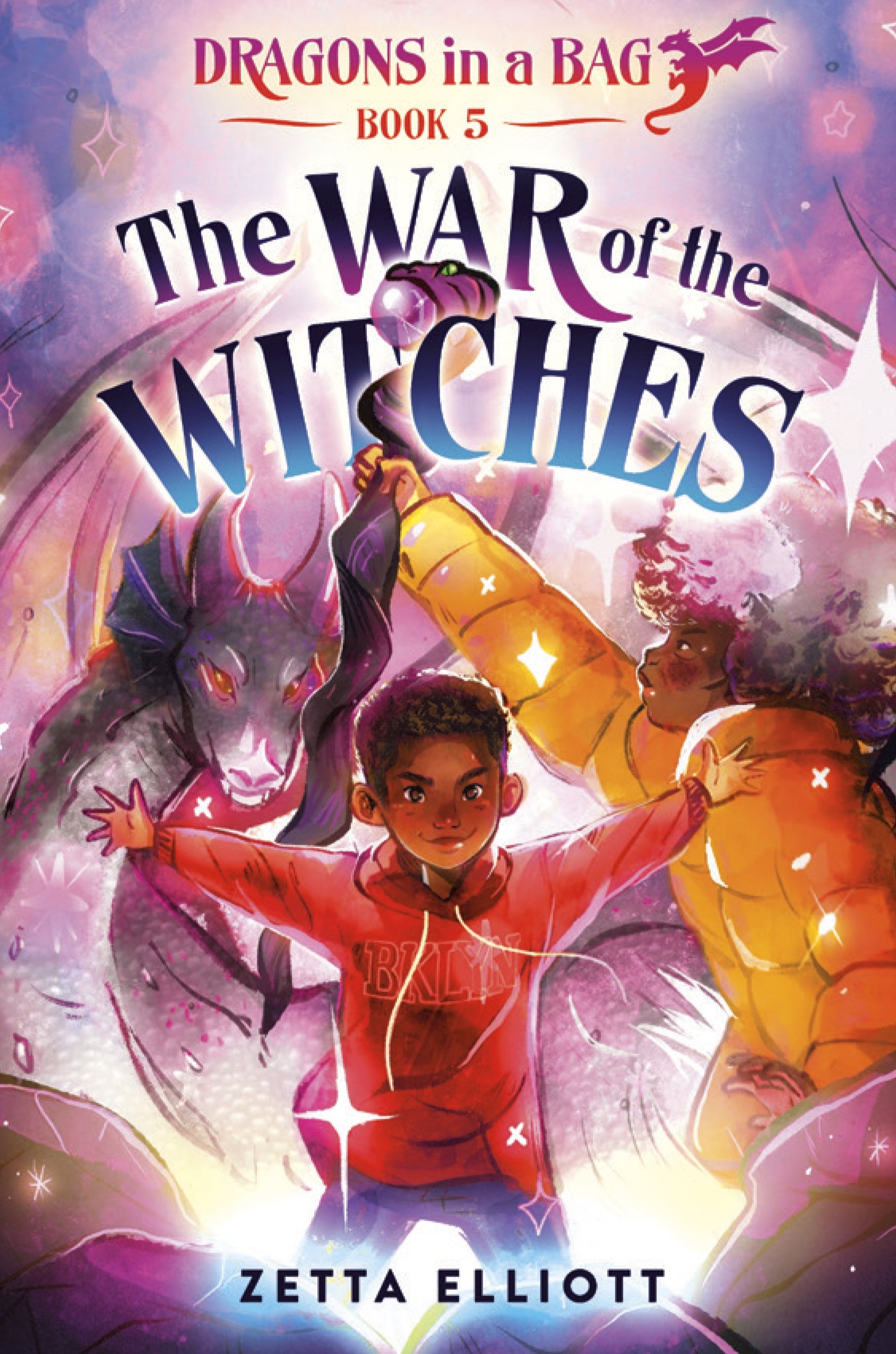
Process Talk: Zetta Elliott on Dragons in a Bag (Part 3)
For some months now, I have been email-chatting with Zetta Elliott about her Dragons in a Bag series. At one point, relative to how the deeply personal finds voice in fiction, she wrote:
In 2004 my father died and I accepted a teaching position in Djibouti. It was my first time in Africa and the job ultimately fell through; I chose to return to Toronto and moved back home with my mother.
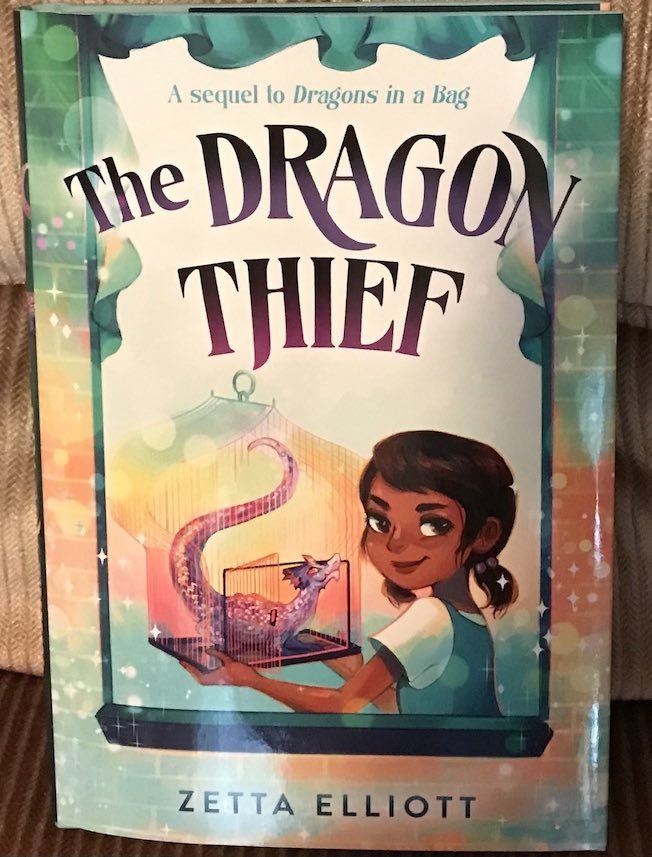
Process Talk: Zetta Elliott on Dragons in a Bag (Part 2)
Here’s Part 2 of my conversation with Zetta Elliott about her Dragons in a Bag series.
[Uma] I was thrilled to see Book 2 weaving in the history of Siddi people in India. It’s a history so subject to centuries of erasure that it just made me happy to see it, particularly this way, so loving and threaded through with magic. Can you tell me more about writing this part of The Dragon Thief?
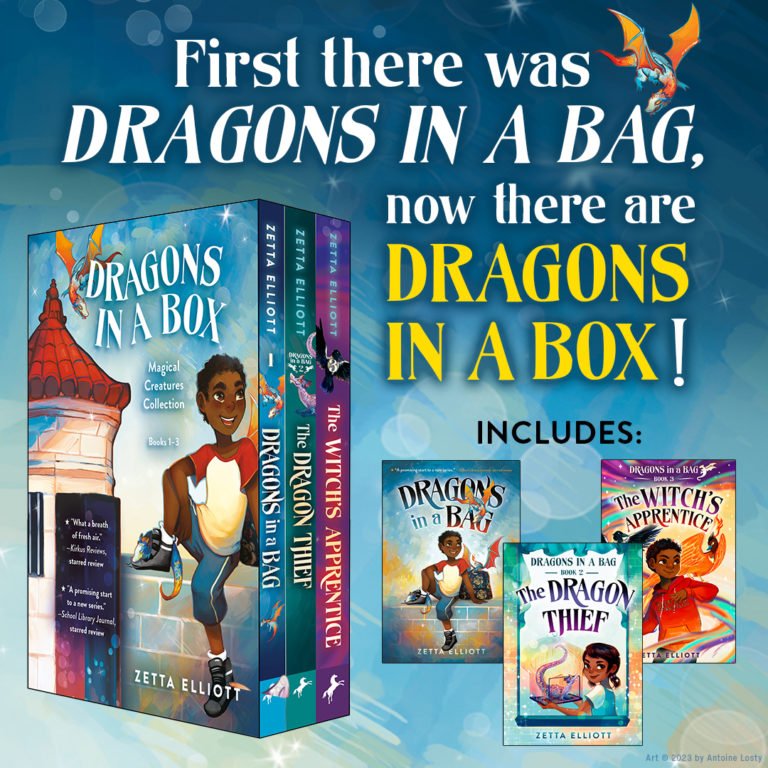
Process Talk: Zetta Elliott on Dragons in a Bag (Part 1)
Zetta Elliott has long been unafraid to address elephants in the rooms of children’s literature that others might prefer to ignore. Back in 2010, in her Horn Book article, she wrote about decolonizing the imagination:
I marvel at the girl I once was. Why would a plump, brown-skinned girl with an Afro embark on a quest to read all the books she could find by Frances Hodgson Burnett? Was I an Anglophile in training, or was my taste in books (and music, and clothes) a way of rejecting popular representations of blackness, which fit me just as poorly (if at all)? Up until grade three I started each school day by singing “God Save the Queen,” so perhaps my taste in literature was the inevitable result of Canada’s colonial legacy.
All of this really spoke to me, since these are the very elephants I’ve done my best to interrogate over the years. So I was interested when Zetta said in her 2023 Zena Sutherland lecture that “fame and visibility shape systems of recognition.” I assumed that her Dragon books have managed to hit the fame button nicely on the nose, but what I wanted to know was what made her write the first book. So I reached out to ask her.
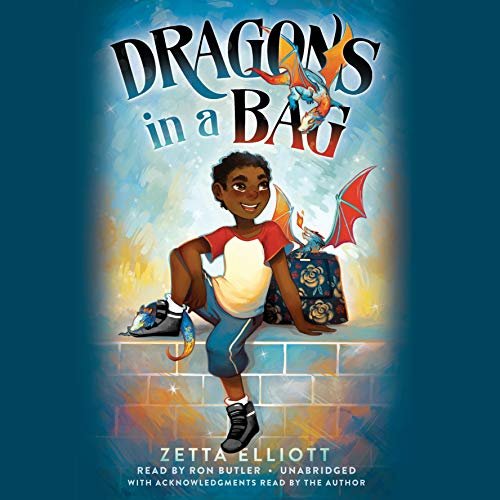
Magic and Community in Dragons in a Bag by Zetta Elliott
I’ve been meaning to read the Dragons in a Bag series by Zetta Elliott for awhile and something or the other kept getting in the way. I finally got to listen to the audiobook of Book 1. It kept me company as I began to muddle through the revision of a middle grade fantasy work-in-progress of my own.

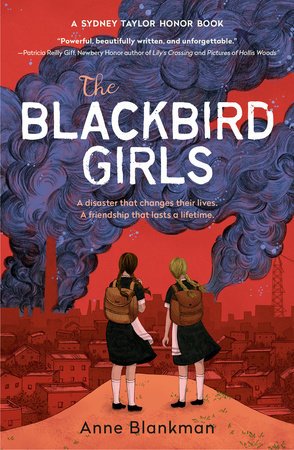
Chernobyl Revisited in The Blackbird Girls by Anne Blankman
In Pripyat, Ukraine, the citizens know an accident could happen at the power plant but they’ve been told that drinking milk and eating cucumbers will cure any radiation sickness that might result.
Fifth grade classmates Valentina Kaplan and Oksana Savchenko are not exactly friends, but now they’re forced into each other’s company by the sudden evacuation prompted by the hideous catastrophe of Chernobyl.


Process Talk: Padma Venkatraman on Born Behind Bars
I’ve been meaning to talk to Padma Venkatraman for a long time. Padma is the multi-talented author of books like The Bridge Home, A Time to Dance, and Island’s End, and a former oceanographer who brings the richness of her life experience to her work.
This lightly edited transcript is drawn from our conversation.
